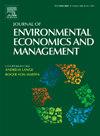Mobilizing credit for clean energy: De-risking and public loan provision under learning spillovers
IF 5.9
3区 经济学
Q1 BUSINESS
Journal of Environmental Economics and Management
Pub Date : 2025-08-19
DOI:10.1016/j.jeem.2025.103222
引用次数: 0
Abstract
This paper analyzes bank lending behavior toward novel clean energy technologies in the presence of high screening costs and potential learning-by-lending. In a two-period model, bank loans in the first period build up banks’ financing experience with the novel technology, which improves lending profitability and partially spills over to peers. Because of these learning externalities, such early-stage loans are either undersupplied by the market (a cooperation problem) or do not occur at all if the banking sector remains stuck in an inferior market equilibrium with no lending (a coordination problem). We propose a policy mix in which public loan provision eliminates the inferior equilibrium, thereby resolving the coordination problem, while de-risking subsidies internalize learning spillovers to peers. Our findings highlight the role of public financial policies if environmental and innovation externalities are already addressed, and we provide a numerical application to the early stage of offshore wind energy in Germany as a plausible context for our policy implications.
调动清洁能源信贷:在学习溢出效应下降低风险和提供公共贷款
本文分析了银行在存在高筛选成本和潜在的贷款学习的情况下对新型清洁能源技术的贷款行为。在两期模型中,第一期银行贷款积累了银行使用新技术的融资经验,提高了贷款盈利能力,并部分溢出给同业。由于这些学习外部性,这种早期阶段的贷款要么是市场供应不足(合作问题),要么是如果银行业仍然陷入没有贷款的劣市场均衡(协调问题),根本就不会发生。我们提出了一种政策组合,其中公共贷款提供消除了次优均衡,从而解决了协调问题,而去风险补贴将学习溢出内部化到同行。我们的研究结果强调了如果环境和创新外部性已经得到解决,公共财政政策的作用,我们提供了德国海上风能早期阶段的数值应用,作为我们政策影响的合理背景。
本文章由计算机程序翻译,如有差异,请以英文原文为准。
求助全文
约1分钟内获得全文
求助全文
来源期刊
CiteScore
8.00
自引率
4.30%
发文量
91
期刊介绍:
The Journal of Environmental Economics and Management publishes theoretical and empirical papers devoted to specific natural resources and environmental issues. For consideration, papers should (1) contain a substantial element embodying the linkage between economic systems and environmental and natural resources systems or (2) be of substantial importance in understanding the management and/or social control of the economy in its relations with the natural environment. Although the general orientation of the journal is toward economics, interdisciplinary papers by researchers in other fields of interest to resource and environmental economists will be welcomed.

 求助内容:
求助内容: 应助结果提醒方式:
应助结果提醒方式:


